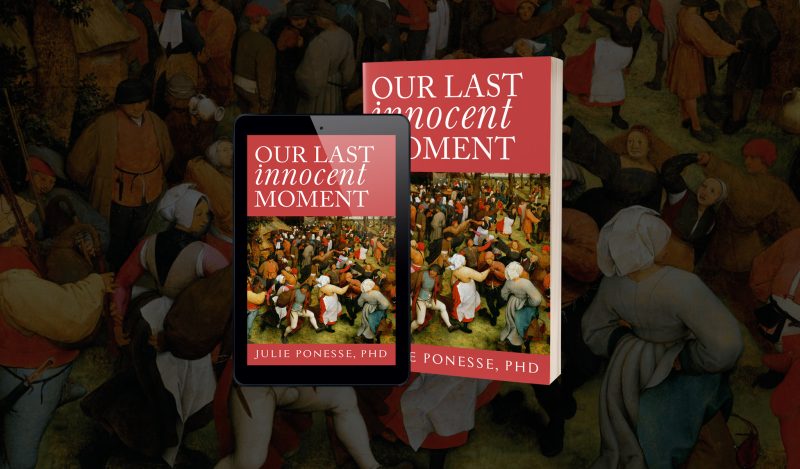The old FedEx envelope was clever, a work of art even, optimistic and colorful, signifying speed and progress. What a beautiful contrast to the plainness of the US Postal Service. For years, I can recall dropping off these treasures and paying maybe $10 to assure its delivery across the country, even the world. For me, it was a fabulous symbol of an improved life, living proof that progress was baked into the historical trajectory.
But two days ago, the clerk at the FedEx office confirmed a different ethos. There was no doing business without a scan of my government-issued ID. I asked for confirmation: so if I did not have this, there is simply no way that I can send a package. Confirmed.
Then came the envelope. It was the color of the brown bag I took to school when I was a kid. Serviceable, drab, dull. Also the new one is stamped with a big green marker: recyclable. There is no design, no art, certainly no beauty. It’s all gone. Its main message is suffering.
What happened to the old envelopes? They’ve been replaced, the clerk explained firmly, with no more detail.
A recycle exhortation suggests shortage. We have to reuse everything because there just isn’t enough to go around. We must sacrifice. The color suggests privation. It’s an aesthetic of sadness and penance. Then of course the price tag came: $26 for delivery not tomorrow but in two days. So compared with some years ago, we pay 2.5 times as much for service half as good as it was.
Don’t complain. It’s just the new way. It’s the new way of life.
What happened to progress? It’s been replaced. The new path is flagellantism: in politics, culture, economics, and everywhere.
The flagellants were a medieval movement of public penitents that roamed from town to town in garbs of woe, flogging themselves and begging as penance for pestilence and war. They were infused with a fiery, apocalyptic, and millenarian passion that they could see terrible moral realities to which others were blinded. The theory was that plagues were being visited upon the earth by God as punishment for sin. The answer was contrition, sorrow, and acts of penance as a means of appeasement, in order to make the bad times go away.
It’s true that there were people who did so in private but that was not the main point. The central focus and purpose of the flagellant movement was to make one’s suffering public and conspicuous, an early version of the virtue signal. In the guise of personal sorrow, they were really about spreading guilt to others. They would show up at any public celebration with a message: your happiness is causing our suffering. The more you party, the more we are forced to bear the burden of the need to be in pain for your sins. Your joy is prolonging the suffering of the world.
Flagellantry is most recognizable in the aesthetic. The first signs I recall seeing of this occurred immediately during the panic of March 2020 when it was proclaimed from on high that a terrible virus was visiting the US. No, you couldn’t see it, but it is highly dangerous, everywhere present, and should be avoided at all costs. You must wash constantly, douse yourself with sanitizer, cover your face, dress in drab colors, and be sad as much as possible.
Fun things were banned: public gatherings, singing, house parties, weddings, and all celebrations. This whole scene took on a political patina, as people were invited to think of the invisible virus as a symbol of a more tangible virus in the White House, an evil man who had invaded a holy space whose malice had leaked out in the culture and now threatened to poison everything. The more you complied with mandatory misery, the more your work made a contribution to making the pestilence go away while we wait for the inoculation. That could take two forms: driving him from the White House or releasing the vaccine which everyone would accept.
Joseph Campbell was correct about the role of religious impulses in the human mind. They never go away. They just take on different forms according to the style of the times. Every single feature of traditional religion found a new expression in the Covid religion. We had masking rituals that were rather complicated but learned and practiced quickly by multitudes: mask on while standing and mask off when sitting. We had sacramentals like social distancing and communion with vaccination. Our holy water became sanitizer and our prophets on earth were government bureaucrats like Fauci.
Flagellantism did not disappear once the old president left and the new one came. Even after the pandemic ended, there were new signs that God was angry. There was the ever-present climate change which was a sign of earth’s anger for being drilled and carved up for energy sources. And the bad country said to be responsible for the unwelcome invader of the White House – Russia – was now rampaging through the holy land of its neighbors.
In addition, the broader problem was capitalism itself, which gave us things like meat, gasoline, fur, and other signs of evil. And what gave rise to capitalism? The answer should be obvious: imperialism, colonialism, racism, and the existence of whiteness – each of which called for mass penance.
The pandemic unleashed it all. It was during this period that corporations decided that profitability alone required signs of suffering and hence the rise of ESG and DEI as new ways to assess economic value of corporate culture. And new practices were added to the list of the highly suspect: monogamy, heterosexuality, and religious traditions such as Christianity and Orthodox Judaism that should now be regarded as deprecated, even as part of the underlying problem.
It was during this period when I found myself on an apartment hunt and observed a newly remodeled offering. I asked why the owner had not replaced the flooring. I was corrected: these are new floors. Impossible, I thought. They are gray and ghastly. That’s the new fashion, I was told. Looking it up, it was true. Gray flooring was being installed everywhere.
How does wood become gray? It dies. It starts to decay. It is swept away by rivers and floats around for years, alternatively soaked, baked by the sun, and soaked again, until every bit of color is drained away. It becomes driftwood, a survivor of the elements and a symbol of the brutality of the cycle of life. Gray flooring is therefore the ideal symbol of the age of suffering, the proper material on which to move back and forth pondering the evils of the world.
In a world governed by flagellantism, ugly formlessness rises to replace aspirational art and imaginative creativity. This is why public art is so depressing and why even the clothing we can afford at the store all looks dreary and uniform. In this world, too, gender differences disappear as luxurious signs of decadence we can no longer afford.
Two other anecdotes. The overhead bins on the flight just now were largely empty, simply because most passengers chose the cheaper Basic Economy fare. This also requires they have no carry-on luggage and hence be forced to pay for checked luggage or travel with all their belongings in a backpack. We’ve gone from gigantic Louis Vuitton steamer trunks to stuffing things in pockets and hiding them from authorities.
Another case in point. I asked the man in the high-end shoe shop why none of the shoes had leather soles. Instead all shoes have these cushy rubber soles that seem weak and pathetic, and make no noise when one steps.
“Everything has changed since covid,” he said. “All shoes are house shoes now.”
I had no words and walked away, my entire thesis confirmed.
Sure enough, all the data we have suggests the mighty triumph of flagellantism. Fertility is down dramatically. Life spans are shortening. People are sicker. Excess deaths are rising. We learn less, read less, write less, create less, love less. Personal trauma is everywhere. The groceries are more expensive so we eat whatever we can, when we can, while hoping for breezes and whatever sunlight there is to provide just the essential energy we need to slog through another day.
Degrowth is the economic model of flagellantism, reducing consumption, embracing privation, acquiescing to austerity. We no longer declare recessions to be on their way because recession is the new way we live, the realization of the plan. The word recession implies a future of recovery, and that is not in the cards.
Decolonization is another watchword. It means feeling so guilty about the space you inhabit that your only moral action is to stay put and reflect on the sufferings of those you have displaced. You can of course say a prayer of supplication to them, so long as you never appropriate any aspect of their culture, since doing so would seem to affirm your rights as a human being.
You want joy, beauty, color, drama, adventure, and love? It’s not gone entirely. Park yourself on a yoga mat on your gray floor and open your computer. Stream something on one of many streaming services you have been provided. Or become a gamer. There you will find what you seek.
The experiences you seek you can only observe as an outsider looking in. It is not participatory. Same with sex: you are there to watch, not physically engage in with others, unless of course you embrace a gender identity other than that declared at your birth. Social distancing never went away; it is how we live in a new age of unending penance.
So, you see, it’s not just about eating bugs. It’s about a whole theory and practice of life and salvation itself, a new religion to replace all the old ones. Cough up your government-issued ID, send your package if you must, think twice before complaining about anything on social media, and figure out a way to channel your depression and despair into quiet humble gratitude and acquiescence. Don’t forget to recycle. The flagellants have taken over the world.
Published under a Creative Commons Attribution 4.0 International License
For reprints, please set the canonical link back to the original Brownstone Institute Article and Author.









